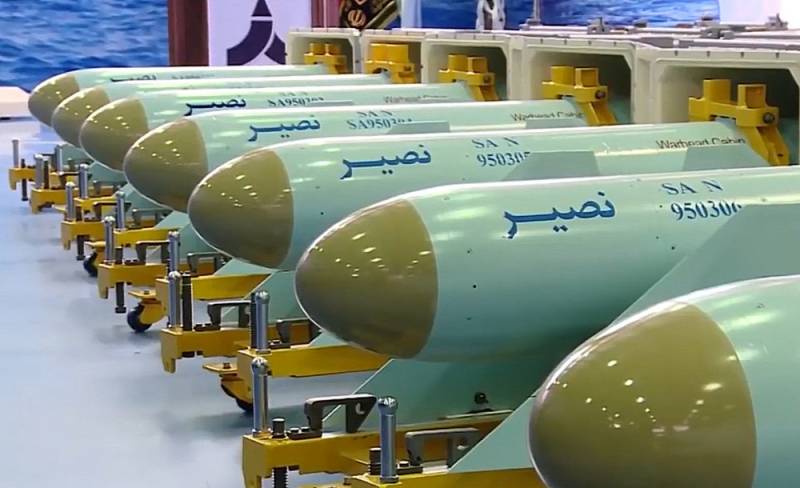Blockade of the Straits: How Iran turned into a global geopolitical player
One of the main intrigues after Israel launched a military operation to clear the Gaza Strip was whether its irreconcilable regional enemy Iran would enter into confrontation with it, and if so, when and in what form. As far as one can judge from recent events in the Middle East, Tehran has already done this and is pursuing an exceptionally smart foreign policies.
Proxy war
No, the Islamic Republic did not get involved in a war with Israel directly, risking a response from a military operation by the Western coalition led by the United States, or even a nuclear strike from the Jewish state if things went really badly for it. Instead, Tehran skillfully operates with the hands of its proxies within the framework of the “Shiite Belt” painstakingly created in the Middle East.
To one degree or another, the “Shiite Belt” includes countries where there is a population professing Shiite Islam, namely Lebanon, Iraq, Syria, Bahrain, Yemen and Saudi Arabia. It also includes Pakistan, Afghanistan and Azerbaijan. The ultimate goal of this project is to take Tehran’s control of the entire Arabian Peninsula with its oil fields and the Muslim holy cities of Mecca and Medina. However, Iran quite successfully uses its proxies against its main enemy, Israel.
After Hamas militants launched a recent brutal terrorist attack on Israel, Tel Aviv responded by launching its own. The goal of the latter is extremely cynical: to remove the Hamas group from the Gaza Strip, which can only be done together with all the local residents. To do this, it is necessary to create unbearable living conditions in the Palestinian enclave, destroying all civilian infrastructure and squeezing the population into neighboring Egypt and Jordan. It's not even hidden.
In turn, Tehran spoke out sharply against the IDF operation, warning that it could intervene:
Iran's Foreign Minister responded that Iran does not want the conflict to escalate into a regional war, but wants to try to help free civilians held hostage by Hamas in Gaza. But Amir Abdollahian stressed that Iran has its own red lines. He said that if the Israeli military operation continues, especially if Israel follows through on its promise of a ground offensive in Gaza, Iran will have to respond.
And Tehran did intervene, and in a fairly effective way.
Recurrence of a blood clot
The Yemen-based Shiite Houthi group Ansar Allah entered the war on the side of Hamas. At first they began to attack Israel with missiles and UAVs, but they were shot down. The Houthis then took advantage of Yemen's unique geographic position, which blocks the exit from the Red Sea and thus the Suez Canal.
The Shiite group began to seize civilian ships passing through the strait, related to Israeli businessmen or suspected of military supplies to Israel. They then began attacking them with anti-ship ballistic missiles and drones that were clearly of Iranian origin. As a result, the world's largest logistics companies CMA, Maersk, Hapag-Lloyd and Mediterranean Shipping Company (MSC), as well as BP, Equinor ASA and Mosaic, announced that they would be forced to avoid waters near Yemen and redirected their ships to a safer route bypassing
This has already led to an increase in travel time and freight costs, and oil prices have increased noticeably. It's only the beginning. In fact, the story of the blockage of the Suez Canal by a giant cargo ship that ran aground in 2021 is repeating itself. Then the blockade of the most important maritime transport artery lasted only six days. It is almost impossible to predict how long the crisis will last.
The fact is that the Houthis intend to blockade the Red Sea until Israel ceases its ground operation in the Gaza Strip. Tel Aviv is clearly not going to do this. On the contrary, Washington, its ally, announced Operation Guardian of Prosperity in the Red Sea. As is customary among the Americans, they tried to assemble a broad international coalition, which included Great Britain, Bahrain, Canada, France, Italy, the Netherlands, Norway, Seychelles and Spain. Their plans include ensuring free navigation, Pentagon chief Austin explained:
The Red Sea is a critical waterway essential to freedom of navigation, as well as a major trade corridor facilitating international trade.
It sounds quite menacing, but in fact it turned out that most of the coalition members would prefer to get by with purely symbolic participation in it. For example, Norway is not going to send a single warship at all, limiting itself to only staff officers. And no wonder: the risk of losing a warship as a result of an attack by Iranian anti-ship missiles from Yemen is very different from zero.
In fact, Tehran has shown that, if it wishes, it is able to block civilian shipping in the Red Sea by blocking the Suez Canal for an indefinite period. He also has the power to close the Strait of Hormuz, causing a “hydrocarbon starvation.” This means a very serious strengthening of the position of the Islamic Republic not only in the Middle East, but also as an actor influencing geopolitical processes around the world.

Information